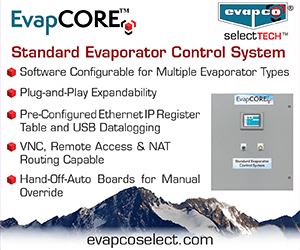IIAR Extends Safety, Education to Global Partners
In several venues, IIAR is helping to promote the use of natural refrigerants and to develop training to familiarize regulatory bodies with industry safety standard practices.
IIAR is planning to have a strong presence at the REFCOLD show in India on November 21, 22 and 23, said Yesenia Rector, IIAR’s International Director.
She said five or six of IIAR’s U.S. company members will have a place in a special IIAR pavilion at REFCOLD. The institute’s presence is important because India’s refrigeration industry is on pace to grow more than 40 percent by next year. “India is very promising,” Rector said. “The need for industrial refrigeration – in particular, ammonia refrigeration – is huge in this county.”
In August, IIAR was active in several Latin American countries, hosting an August event in Mexico, helping develop a university program in Chile, hosting a conference in Argentina, and participating in a conference in Colombia.
The early-August event in Guadalajara, Mexico, was aimed at helping end-users, as well as Mexico’s regulatory bodies, become more familiar with IIAR and resources the institute offers, Rector said.
Some of the topics discussed were the regulation of synthetic refrigerants in Latin America, comparisons of ammonia and carbon dioxide systems, and best practices regarding the safe operations of these systems.
Included in the event was a “a practical workshop for ammonia refrigeration – for its use and safety,” Rector said. The workshop had presentations about safety release valve protection and ammonia detection.
“We wanted to do something similar to what we’re doing in the United States annual expo, Rector said.
Earlier this year in Chile, the University of Santiago began offering a degree in refrigeration engineering using curriculum based largely on IIAR materials. The first students are preparing to graduate, and instructors along with local authorities and IIAR leadership are working to adapt the curriculum to the lessons learned from the inaugural class.
“They’re ready to start working on version 2.0,” Rector said, adding that the next class will convene in the spring of 2020.
IIAR was active in an August conference in Buenos Aires, Argentina. Similar to the event in Mexico, the purpose was to educate end-users and inform regulatory bodies about the work IIAR has done, and how we can assist them in developing safety standards for their country.
“There’s a lot of push back, a lot of fear. Authorities don’t understand how this industry can flourish — so we’re spreading the word… the key is education.”
Yesenia Rector, IIAR’s International Director
The Buenos Aires event had a slightly different focus from the Mexico conference. Rector said, explaining that it covered more basic refrigeration concepts. “About 60 to 70 percent of the attendees were end-users,” Rector said. “They have specifically requested basic information about the operation of ammonia refrigeration systems.”
This request is significant because Argentina’s government has been hesitant to promote the ammonia refrigeration industry, and Rector said she hoped the event could help clear up some misconceptions about the industry.
“There’s a lot of push back, a lot of fear,” Rector said. “Authorities don’t understand how this industry can flourish – so we’re spreading the word… the key is education.”
In late August, IIAR has partnered with the Asociación Colombiana De Acondicionamiento Del Aire Y De La Refrigeración, or ACAIRE. While that association’s function has mostly focused on air conditioning, Rector said ACAIRE agreed to host IIAR at their annual expo August 28-30 in Barranquilla to get the word out about the ammonia refrigeration industry.
IIAR had a booth at the ACAIRE Expo, and the intent was “to expose more people to the nature of ammonia refrigeration,” Rector said. While this might sound fairly commonplace, the mission is critical.
While there are many ammonia refrigeration systems established in Colombia, the operators and engineers of these systems do not have the resources they need to maintain them correctly, Rector said. This is due in part to ammonia’s reputation in that country as a chemical used in the production of narcotics, she explained.
“No one wants to say, ‘ I have an industrial refrigeration system that runs on ammonia’,” Rector said. “These systems are operating out there, and the endusers and operators don’t seek the help they may need because they are afraid to admit [they’re using ammonia.]”
Rector hopes IIAR’s partnership with ACAIRE can legitimize the use of ammonia in Colombia and help clear its name.













